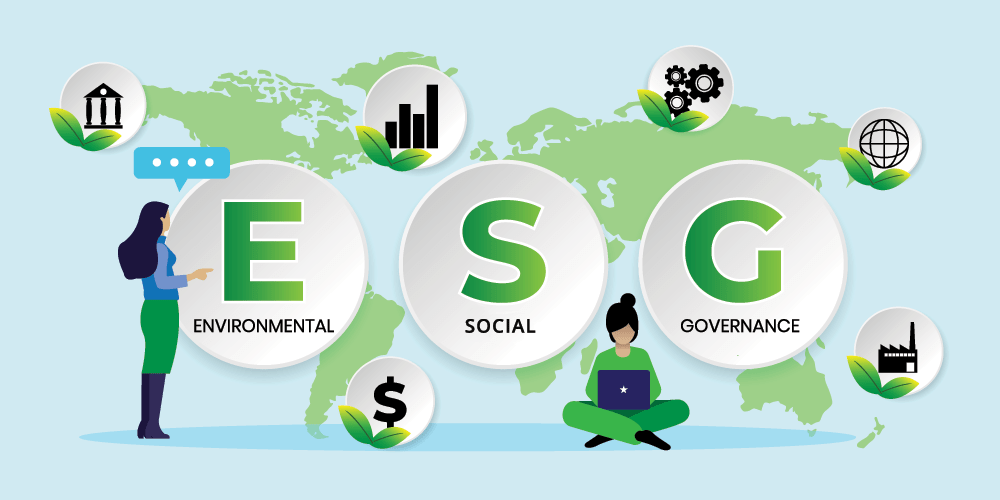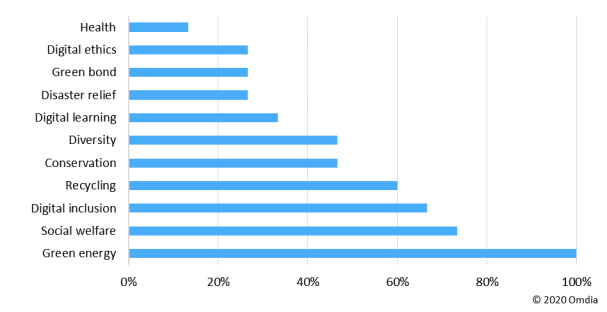Omdia’s first research into service providers’ Environmental, Social and Governance (ESG) strategies finds that green energy, digital inclusion, and social welfare lead the sector’s efforts to improve social and environmental well-being.
ESG strategies return ethical and tangible benefits
How a company’s activities affect the environment and society it operates in is an increasingly important component of corporate strategic decision-making. And as key ethical considerations of environmental and societal well-being are given more attention by consumers, investors, governments, and the media, it becomes more important for telecoms operators not just to reflect these concerns but to see the opportunity to take the lead on measures to address them. Benefits to a communications service provider of a successful ESG strategy include:
- Improving consumers’ perception of it if it successfully differentiates around its ESG strategy and effectively communicates this
- Meeting investors’ criteria for allocating funds with ethical companies
- Gaining inclusion to certain investment funds or stock exchange indexes
- Complying with government laws and gaining access to national resources, for example, spectrum
- Meeting enterprise customers’ selection criteria
- Setting the agenda on ESG best practice to be a model for governments and societies by which to measure other companies’ and industries’ ethical standing
Omdia’s first research into service providers’ ESG initiatives, which provides a view on telecoms operating groups and sector ESG initiatives announced from 2019 to November 2020, covers 192 announcements from the largest 15 service providers by revenue. The ESG Service Provider Index finds that 50% of service providers’ ESG efforts were focused on improving societal well-being, while 40% were focused on the environment, and 10% were governance measures aimed at improving the ESG efforts of the company itself or its operations.
n terms of the most active ESG areas among the featured companies, the research finds that green energy was accountable for the highest number of individual measures over the research period, equivalent to 25.3% of total initiatives, followed by digital inclusion (16.7%) and social welfare (16.7%), as shown in Figure 1.
Figure 1: ESG activities by area, % of total operator measures, 2019–20
The research also finds that all 15 service providers announced at least one green energy initiative over the research period, while 73.3% announced at least one measure in social welfare, and 60.0% announced measures to improve the recycling capabilities of their operations, as shown in Figure 2.
Figure 2: ESG activity by operating group by area (%)
Examples of significant commitments announced 2019/20 to promote diversity include Vodafone’s commitment to base 20% of its supplier selection criteria on commitments to diversity, Verizon’s fund to help women into the tech and media industries, AT&T’s pledge to spend $3 billion on black-owned businesses in the US, and KDDI’s management program designed to foster diversity.
However, diversity and digital ethics are two ESG areas that saw less activity over the research period, with 53.3% of operators announcing no diversity measures and 73.3% making no announcements around digital ethics. As these issues become more important to society, the media, and politicians alike, they can be expected in the coming years to move up service providers’ corporate strategic agenda.
Among the 15 companies covered in the tracker, Vodafone, Orange, Verizon, and Telefónica launched green bonds over the research period. Governance-focused environmental ESG initiatives such as green bonds enable companies to fund plans to reduce their carbon footprint and source energy from renewable sources. Again, given the relatively low levels of industry-wide green bond activity, this is an area that can be expected to grow over the coming years as telcos look to finance their network modernization plans and other ESG initiatives.
Vodafone, BT, Orange, Deutsche Telekom, Telefónica, Verizon, Comcast, and KDDI are among operators to have pledged a date by which they will reduce their carbon emissions to net zero, while many operator climate commitments also include sourcing energy from carbon-neutral suppliers. Other green energy initiatives include reducing water consumption, while some service providers, such as China Mobile, are building their own renewable-energy power facilities.
Service providers can connect us to the good and to each other
In formulating ESG strategies, service providers have followed a broad range of measures to improve their near-term ethical standing and, over the mid and long term, reduce both their impact on the environment and their costs by using sustainable energy. Service providers covered in the research have also been active in putting in place inclusion, social welfare, and digital initiatives in ways that enable them to apply their strengths and capabilities in order to bring tangible benefits to diverse communities. Looking forward, an industry that thrives from connecting people can be expected to accelerate its efforts to forge better connections between us, our society, and the environment.
Green energy, digital inclusion lead telco social and environmental activities in Omdia’s first ESG Index
More from author
More insights
Assess the marketplace with our extensive insights collection.
More insightsHear from analysts
When you partner with Omdia, you gain access to our highly rated Ask An Analyst service.
Hear from analystsOmdia Newsroom
Read the latest press releases from Omdia.
Omdia NewsroomSolutions
Leverage unique access to market leading analysts and profit from their deep industry expertise.
Solutions






